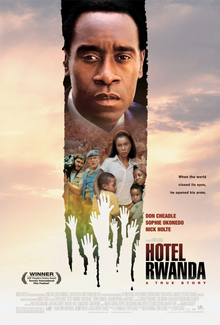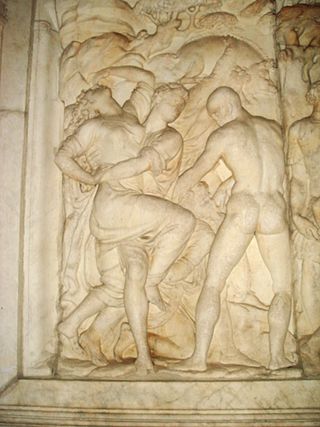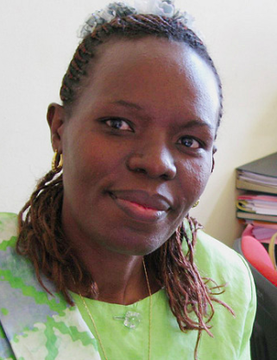
The Rwandan genocide, also known as the genocide against the Tutsi, occurred from 7 April to 19 July 1994 during the Rwandan Civil War. Over a span of around 100 days, members of the Tutsi ethnic group, as well as some moderate Hutu and Twa, were systematically killed by Hutu militias. While the Rwandan Constitution states that over 1 million people were killed, most scholarly estimates suggest between 500,000 and 662,000 Tutsi died. The genocide was marked by extreme violence, with victims often murdered by neighbors, and widespread sexual violence, with between 250,000 and 500,000 women raped.

Hotel Rwanda is a 2004 biographical historical drama film co-written and directed by Terry George. It was adapted from a screenplay by George and Keir Pearson, and stars Don Cheadle and Sophie Okonedo as hotelier Paul Rusesabagina and his wife Tatiana. Based on the Rwandan genocide, which occurred during the spring of 1994, the film depicts Rusesabagina's efforts to save the lives of his family and more than 1,000 other refugees by providing them with shelter in the besieged Hôtel des Mille Collines. Hotel Rwanda explores genocide, political corruption, and the repercussions of violence.

Pauline Nyiramasuhuko is a Rwandan politician who was the Minister for Family Welfare and the Advancement of Women. She was convicted of having incited troops and militia to carry out rape during the Rwandan genocide of 1994. She was tried for genocide and incitement to rape as part of the "Butare Group" at the International Criminal Tribunal for Rwanda (ICTR) in Arusha, Tanzania. In June 2011, she was convicted of seven charges and sentenced to life imprisonment. Nyiramasuhuko is the first woman to be convicted of genocide by the ICTR, and the first woman to be convicted of genocidal rape.
The Gacaca courts were a system of transitional justice in Rwanda following the 1994 genocide. The term 'gacaca' can be translated as 'short grass' referring to the public space where neighborhood male elders (abagabo) used to meet to solve local problems. The name of this system was then adopted in 2001 as the title of the state's new criminal justice system "Gacaca Courts" to try those deemed responsible for the 1994 Genocide against the Tutsi where over 1,000,000 people were killed, tortured and raped. In 1994, the United Nations Security Council created the International Criminal Tribunal for Rwanda to try high-ranking government and army officials accused of genocide, war crimes, and crimes against humanity. The Gacaca Courts were established in law in 2001, began to operate on a trial basis in 2002 and eventually came to operate as trials throughout the country by early 2007. The Gacaca courts were presented as a method of transitional justice, claimed by the Rwandan government to promote communal healing and rebuilding in the wake of the Rwandan Genocide. Rwanda has especially focused on community rebuilding placing justice in the hands of trusted citizens.

The Kivu conflict is an umbrella term for a series of protracted armed conflicts in the North Kivu and South Kivu provinces in the eastern Democratic Republic of the Congo which have occurred since the end of the Second Congo War. Including neighboring Ituri province, there are more than 120 different armed groups active in the eastern Democratic Republic of Congo. Currently, some of the most active rebel groups include the Allied Democratic Forces, the Cooperative for the Development of the Congo, the March 23 Movement, and many local Mai Mai militias. In addition to rebel groups and the governmental FARDC troops, a number of national and international organizations have intervened militarily in the conflict, including the United Nations force known as MONUSCO, and an East African Community regional force.
Bosco Ntaganda is a convicted war criminal and the former military chief of staff of the National Congress for the Defense of the People (CNDP), an armed militia group operating in the North Kivu province of the Democratic Republic of the Congo (DRC). He is a former member of the Rwandan Patriotic Army and allegedly a former Deputy Chief of the General Staff of the Patriotic Forces for the Liberation of Congo (FPLC), the military wing of the Union of Congolese Patriots.
Survivors Fund (SURF), founded in 1997, represents and supports survivors of the Genocide against the Tutsi in Rwanda in Rwanda. It is the principal international charity with a specific remit to assist survivors of the Genocide against the Tutsi in Rwanda, and has offices in London and Kigali. It is registered with the Charity Commission for England & Wales.

Wartime sexual violence is rape or other forms of sexual violence committed by combatants during an armed conflict, war, or military occupation often as spoils of war, but sometimes, particularly in ethnic conflict, the phenomenon has broader sociological motives. Wartime sexual violence may also include gang rape and rape with objects. It is distinguished from sexual harassment, sexual assaults and rape committed amongst troops in military service.

The Democratic Republic of the Congo, and the east of the country in particular, has been described as the "Rape Capital of the World", and the prevalence and intensity of all forms of sexual violence has been described as the worst in the world. Human Rights Watch defines sexual violence as "an act of a sexual nature by force, or by threat of force or coercion", and rape as "a form of sexual violence during which the body of a person is invaded, resulting in penetration, however slight, of any part of the body of the victim, with a sexual organ, or of the anal or genital opening of the victim with any object or other part of the body."
Jonathan Torgovnik is an Israeli photographer and photojournalist. He lives in Johannesburg, in South Africa. He spent two years in Rwanda photographing women who had been systematically raped during the Rwandan genocide in 1994, and the children born from those rapes. The photographs and the story were published in the Daily Telegraph magazine in 2007. A charity, Foundation Rwanda, was founded as a result. In 2014, Torgovnik returned to Rwanda. In 2015 he documented the lives of migrants who have moved, many of them illegally, to South Africa from other African countries such as Tanzania, Zimbabwe and Malawi.
The Democratic Republic of the Congo (DRC) ratified the 2000 UN TIP Protocol in October 2005.
The DRC Mapping Exercise Report, or the Democratic Republic of the Congo 1993-2003 UN Mapping Report, was a report by the United Nations within the Democratic Republic of the Congo in the wake of the armed aggressions and war which took place between March 1993 and June 2003. Its aim was to map the most serious violations of human rights, together with violations of international humanitarian law, committed within the Democratic Republic of the Congo. In doing this it was to assess the capacities within the national justice system to deal appropriately with such human rights violations and to formulate a series of options aimed at assisting the government of the Democratic Republic of the Congo in identifying appropriate transitional justice mechanisms to deal with the legacy of these violations. It contained 550 pages and contained descriptions of 617 alleged violent incidents.

Minova is a town in the Kalehe Territory, Democratic Republic of the Congo. It is an important business center for farm-fishery products. It is very close to Idjwi Island, Masisi Territory, Lake Kivu on its North Western shore and is only 45 km from the Goma city. The town's development is linked with important refugee-related history, including those from Rwanda in 1994, those from Masisi in 1992–1997, and other surrounding areas in northern South Kivu Province, Democratic Republic of the Congo. It is known for being the site of the systematic rape of refugees by DRC troops. WE actually find many local organisations involved in the management of Gender Based Violence (GBV) working tirelessly to restore dignity to women and girls who were raped( Panzi Foundation DRC is one of them, and it is very active in Buzi -Bulenga area).

Genocidal rape, a form of wartime sexual violence, is the action of a group which has carried out acts of mass rape and gang rapes, against its enemy during wartime as part of a genocidal campaign. During the Armenian genocide, the Greek genocide, the Assyrian genocide, the second Sino-Japanese war, the Holocaust, the Bangladesh Liberation War, the Bosnian War, the Rwandan genocide, the Tamil genocide, the Circassian genocide, the Congolese conflicts, the South Sudanese Civil War, the Yazidi Genocide, and Rohingya genocide, mass rapes that had been an integral part of those conflicts brought the concept of genocidal rape to international prominence. Although war rape has been a recurrent feature in conflicts throughout human history, it has usually been looked upon as a by-product of conflict and not an integral part of military policy.
During the Rwandan genocide of 1994, over the course of 100 days, up to half a million women and children were raped, sexually mutilated, or murdered. The International Criminal Tribunal for Rwanda (ICTR) handed down the first conviction for the use of rape as a weapon of war during the civil conflict, and, because the intent of the mass violence against Rwandan women and children was to destroy, in whole or in part, a particular ethnic group, it was the first time that mass rape during wartime was found to be an act of genocidal rape.
During the first and second conflicts in the Democratic Republic of the Congo (DRC), all armed parties to the conflict carried out a policy of genocidal rape, with the primary purpose being the total destruction of communities and families. Such was the violence directed at and carried out towards women that Human Rights Watch (HRW) described it as "a war within a war". HRW has reported that as of March 2013, civil conflict had reignited when the militia, March 23 Movement (M23), resumed hostilities following a ceasefire.
Beatrice Munyenyezi is a Rwandan woman known for her involvement in the Rwandan Genocide. She sought political asylum in the United States where she successfully applied citing persecution in her home country. Almost two decades later, in 2013, a US court prosecuted Beatrice for lying about her political affiliation during the Rwandan genocide. She was stripped of her American citizenship, imprisoned and eventually deported back to Rwanda, where she was given a life sentence.

Judith Kanakuze was a Rwandan politician and women's rights activist best known for passing legislation against gender-based violence, including Rwanda's first legal definition of rape, and contributing constitutional gender quotas that required women's representation in governmental bodies. She worked in multiple fields, including nutrition and civil service, before becoming a prominent leader of women after the 1994 Rwandan genocide, in which she lost most of her extended family. Kanakuze founded the early women's organization Réseau des Femmes and represented women's interests at the Arusha Accords and on Rwanda's committee to establish a constitution. The gender quotas that required women to compose at least 30 percent of governmental bodies subsequently quickly spurred women's participation to exceed the quotas in parliament. She was elected to Parliament in 2003 and reelected in 2008. During her terms, she presided over the Rwanda Women Parliamentary Forum.

During the First Congo War, Rwandan, Congolese, and Burundian Hutu men, women, and children in villages and refugee camps were hunted down and became victims of mass killings in eastern Zaire.
Jo Ingabire Moys is a Rwandan-British writer, actress and director whose debut short film Bazigaga was nominated for a BAFTA after a successful festival tour.







